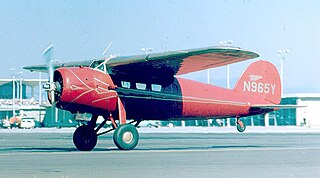
The Lockheed P-80 Shooting Star was the first jet fighter used operationally by the United States Army Air Forces (USAAF) during World War II. Designed and built by Lockheed in 1943 and delivered just 143 days from the start of design, production models were flying, and two pre-production models did see very limited service in Italy just before the end of World War II. Designed with straight wings, the type saw extensive combat in Korea with the United States Air Force (USAF) as the F-80.

Air Force One is the official air traffic control designated call sign for a United States Air Force aircraft carrying the president of the United States. The term is commonly used to denote U.S. Air Force aircraft modified and used to transport the president, and as a metonym for the primary presidential aircraft, VC-25, although it can be used to refer to any Air Force aircraft the president travels on.

The Lockheed Vega is an American five- to seven-seat high-wing monoplane airliner built by the Lockheed Corporation starting in 1927. It became famous for its use by a number of record-breaking pilots who were attracted to its high speed and long range. Amelia Earhart became the first woman to fly solo across the Atlantic Ocean in one, and Wiley Post used his to prove the existence of the jet stream after flying around the world twice.

The Lockheed Constellation ("Connie") is a propeller-driven, four-engined airliner built by Lockheed Corporation starting in 1943. The Constellation series was the first civil airliner family to enter widespread use equipped with a pressurized cabin, enabling it to fly well above most bad weather, thus significantly improving the general safety and ease of commercial passenger air travel.
The Lockheed Model 10 Electra is an American twin-engined, all-metal monoplane airliner developed by the Lockheed Aircraft Corporation, which was produced primarily in the 1930s to compete with the Boeing 247 and Douglas DC-2. The type gained considerable fame as one was flown by Amelia Earhart and Fred Noonan on their ill-fated around-the-world expedition in 1937.

The Museum of Flight is a private non-profit air and space museum in the Seattle metropolitan area. It is located at the southern end of King County International Airport in the city of Tukwila, immediately south of Seattle. It was established in 1965 and is fully accredited by the American Alliance of Museums. As the largest private air and space museum in the world, it also hosts large K–12 educational programs.

The National Museum of the United States Air Force is the official museum of the United States Air Force located at Wright-Patterson Air Force Base, six miles (9.7 km) northeast of Dayton, Ohio. The NMUSAF is the oldest and largest military aviation museum in the world, with more than 360 aircraft and missiles on display. The museum is a central component of the National Aviation Heritage Area. The museum draws about a million visitors each year, making it one of the most frequently visited tourist attractions in Ohio.

The Lockheed Model 18 Lodestar is an American passenger transport aircraft of the World War II era, developed as part of the Model 10 Electra family, specifically from the Lockheed Model 14 Super Electra.

The Lockheed Ventura is a twin-engine medium bomber and patrol bomber of World War II.

The Lockheed JetStar is a business jet produced from the early 1960s to the 1970s. The JetStar was the first dedicated business jet to enter service, as well as the only such airplane built by Lockheed. It was also one of the largest aircraft in the class for many years, seating ten plus two crew. It is distinguishable from other small jets by its four engines, mounted on the rear of the fuselage, and the "slipper"-style fuel tanks fixed to the wings.

Planes of Fame Air Museum is an aviation museum at Chino Airport in Chino, California.

Air Force Two is the air traffic control designated call sign held by any United States Air Force aircraft carrying the vice president of the United States, but not the president. The term is often associated with the Boeing C-32, a modified 757 which is most commonly used as the vice president's transport. Other 89th Airlift Wing aircraft, such as the Boeing C-40 Clipper, C-20B, C-37A, and C-37B, have also served in this role. The VC-25A, the aircraft most often used by the president as Air Force One, has also been used by the vice president as Air Force Two.

Pinal Airpark, also known as Pinal County Airpark, is a non-towered, county-owned, public-use airport located 8 miles northwest of the central business district of Marana, in Pinal County, Arizona, United States. Silverbell Army Heliport is co-located with Pinal Airpark. The heliport is a private-use military facility operated by the Arizona Army National Guard.

The 1254th Air Transport Wing was a United States Air Force unit, existing between 1948 and 1966. It was last stationed at Andrews AFB, Maryland.

The United States Air Force Special Air Mission provides air transportation for the president of the United States (POTUS), vice president of the United States (VPOTUS), first lady of the United States (FLOTUS), presidential Cabinet, U.S. congressional delegations (CODELs), and other high-ranking American and foreign dignitaries.

The Lockheed C-121 Constellation is a military transport version of the Lockheed Constellation. A total of 332 aircraft were constructed for both the United States Air Force and United States Navy for various purposes. Numerous airborne early warning versions were also constructed. The C-121 later saw service with smaller civilian operators until 1993.

The Arizona Commemorative Air Force Museum, a.k.a. Airbase Arizona Aircraft Museum, was established in 1978, in Falcon Field in Mesa, Arizona. It is the 10th unit of the Commemorative Air Force and the home of one of the largest Commemorative Air Force units in the world. On exhibit are World War II artifacts, helicopters and classic American and foreign combat planes, many of which are the last remaining warbirds of their kinds.


















